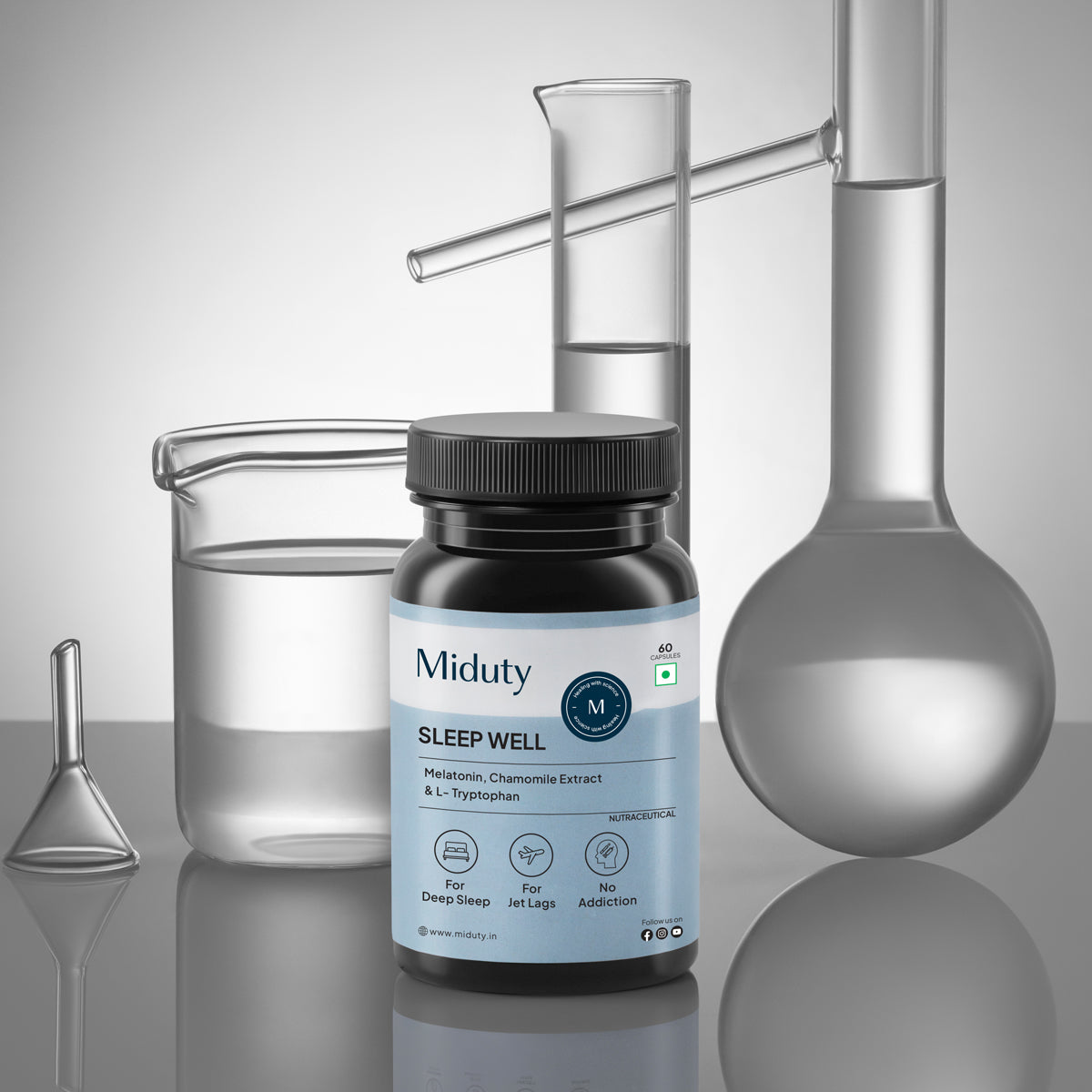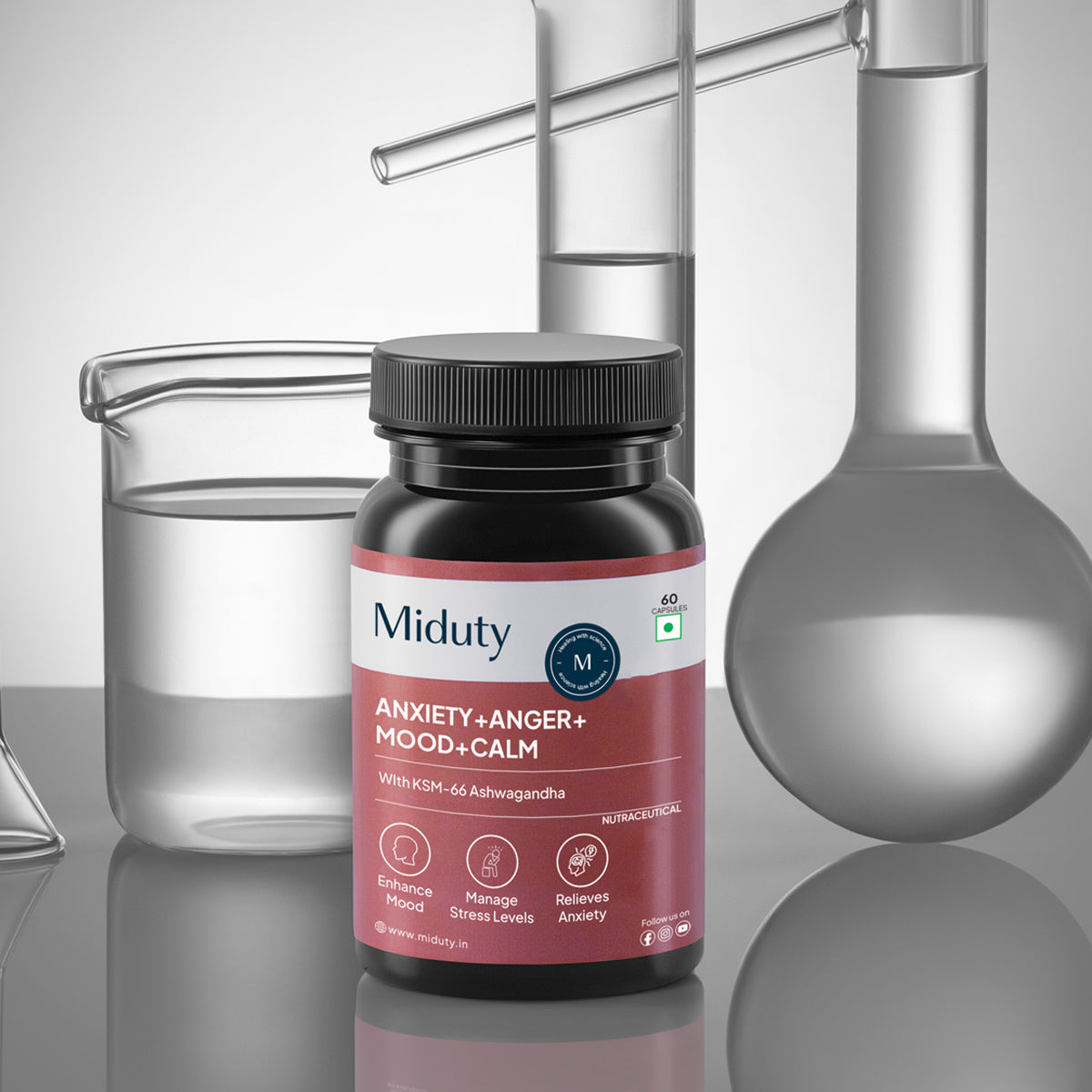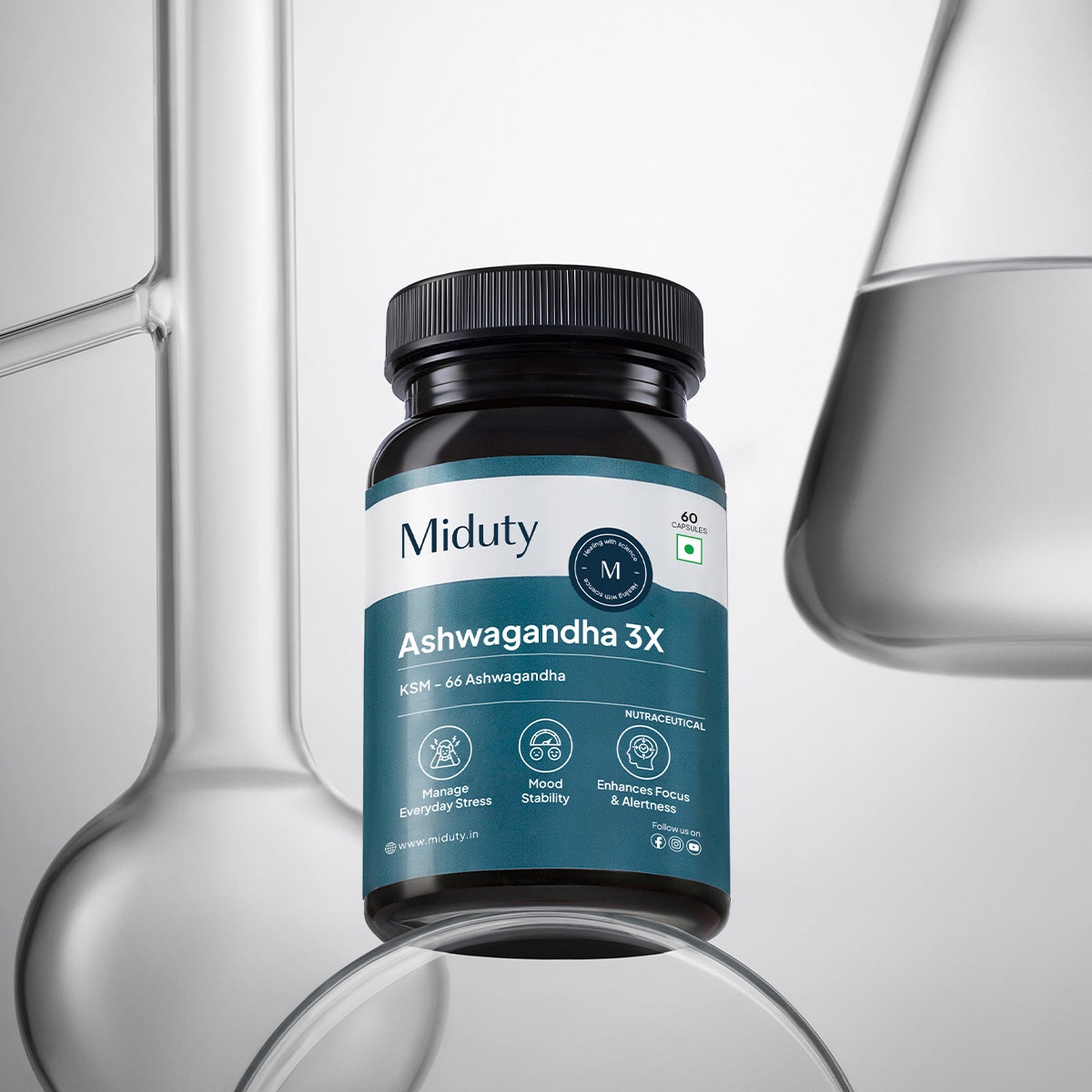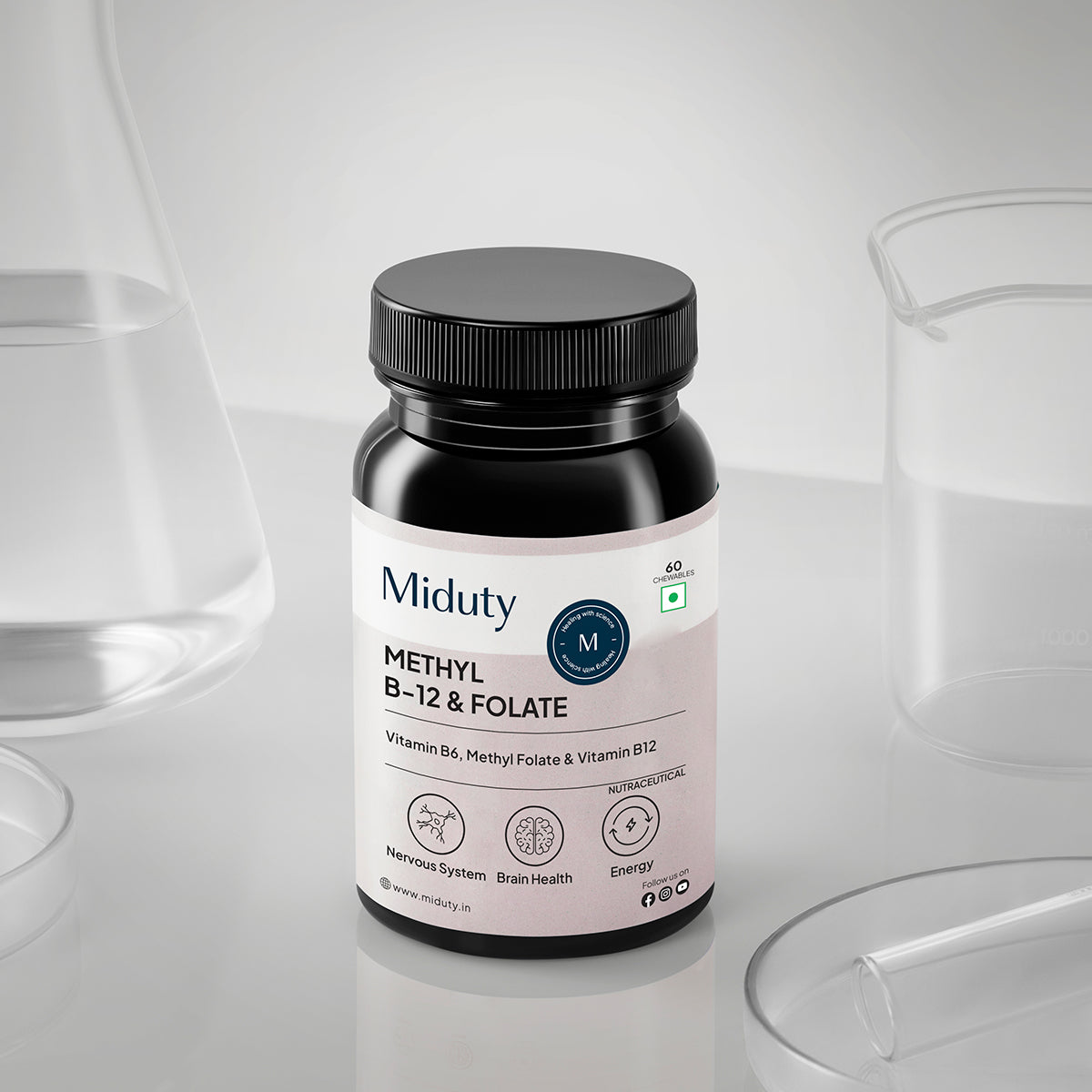
Cortisol: The Stress Hormone That Controls Your Body
Cortisol is a steroid hormone made by the adrenal glands, which sit atop each kidney. Known as the "stress hormone," it plays a key role in the body's fight-or-flight response, but its functions go far beyond stress. Cortisol helps regulate metabolism, control inflammation, support immune function, and even aid memory.
It's classified as a glucocorticoid and is released through a chain reaction starting in the brain's hypothalamus and pituitary gland—together forming the HPA axis. Once released, cortisol travels through the bloodstream, affecting various organs and systems.
Cortisol isn't bad on its own—it's essential. The trouble begins when levels stay too high or too low for too long. In moderation, cortisol boosts energy and focus during stress. But chronic elevation can wear the body down, turning everyday problems into ongoing health issues.
Key Takeaways
1. Cortisol is essential for stress response, energy, and metabolism—but must stay balanced. Too much or too little can disrupt nearly every system in your body.
2. Chronic stress and poor habits can lead to high or low cortisol, harming your health. Lifestyle choices often play a bigger role than underlying medical conditions.
3. Eat balanced meals regularly and avoid sugar, caffeine, and seed oils to support cortisol. Stable blood sugar helps prevent unnecessary cortisol spikes.
4. Supplements like ashwagandha, magnesium, and B vitamins help regulate cortisol naturally. Use them to support, not replace, a nutrient-rich, whole-food diet.
5. Watch for symptoms like fatigue, anxiety, and weight gain—they may signal cortisol imbalance. Early detection and simple lifestyle changes can make a big difference.
What is Cortisol and why is it called "The Stress Hormone"?
Cortisol earns its nickname "stress hormone" because it's released when your brain perceives a threat - like a looming deadline or a real danger. It floods your body with energy, boosts blood pressure, and pauses non-essential functions like digestion so you can react fast.
But here's the problem: your body can't tell the difference between real danger and daily stressors like emails or bills. It responds the same way, pumping out cortisol. When stress becomes constant, so does cortisol, leading to issues like anxiety, insomnia, weight gain, and high blood pressure. In short bursts, cortisol is helpful—but when it's always running, it wears you down.
Functions of Cortisol in the Body
Cortisol is a multitasker. While it's primarily known for its role in stress response, it serves several other vital functions:
1. Metabolism Regulation
Cortisol helps break down proteins, fats, and carbohydrates to generate energy. It also regulates blood glucose levels by stimulating gluconeogenesis—creating glucose from non-carbohydrate sources in the liver.
2. Anti-Inflammatory Effects
Cortisol reduces inflammation by inhibiting the release of substances that trigger immune responses. This is why synthetic corticosteroids are often prescribed to treat inflammatory conditions like asthma or arthritis.
3. Blood Pressure Control
It helps regulate the balance of salt and water in the body, affecting blood volume and, consequently, blood pressure.
4. Memory Formation
Some research suggests that moderate levels of cortisol enhance memory retention. However, too much cortisol for too long can impair cognitive functions.
5. Immune System Suppression
While helpful in preventing overactive immune responses, excessive cortisol can leave you more vulnerable to infections.
Essentially, cortisol is a hormone of balance. Too little, and your body can't manage stress or maintain energy levels. Too much, and your system becomes overwhelmed, leading to various chronic conditions.
Causes of Cortisol Imbalance
Daily lifestyle habits are major contributors to cortisol imbalance—even without a medical condition. Here's how:
1. Chronic Stress: Constant stress from work, relationships, or daily hassles keeps cortisol elevated, leading to burnout.
2. Poor Diet: Sugar, processed foods, caffeine, and skipping meals can spike or crash cortisol levels.
3. Lack of Sleep: Inconsistent or poor-quality sleep disrupts cortisol's natural rhythm.
4. Overexercising or Inactivity: Too much intense exercise or too little movement both strain cortisol balance.
5. Mental Health: Anxiety and trauma keep your body in "stress mode," driving chronic cortisol release.
Balancing cortisol starts with small, sustainable changes like better sleep, mindful eating, and stress management.
Common Symptoms of High Cortisol
When cortisol levels remain high for extended periods, your body begins to show warning signs. While occasional spikes are normal and even helpful in emergencies, chronic elevation turns harmful. Often, symptoms sneak up subtly—disguised as everyday fatigue, irritability, or poor sleep. Over time, these signs intensify, affecting your overall health and well-being.
- Persistent fatigue and brain fog – You feel drained despite rest.
- Weight gain – Especially around the abdomen and face, driven by increased appetite and fat storage.
- Mood swings, anxiety, or depression – High cortisol disrupts brain chemistry.
- High blood pressure and rapid heart rate – Your body stays in a stressed "fight-or-flight" state.
- Poor sleep or insomnia – Cortisol interferes with natural sleep cycles.
- Frequent illness – Suppressed immunity makes infections more likely.
-
Thinning skin and easy bruising – Caused by impaired collagen production.
These symptoms are often mistaken for aging or work-related stress but could indicate an underlying cortisol imbalance.
Long-Term Health Risks of High Cortisol
If left unchecked, chronic high cortisol—also known as hypercortisolism or Cushing's syndrome—can lead to serious conditions:
- Heart disease – Elevated blood pressure and cholesterol.
- Type 2 diabetes – Ongoing blood sugar spikes can lead to insulin resistance.
- Obesity – Especially dangerous visceral fat gain.
- Cognitive decline – Linked to memory loss and reduced brain function.
- Muscle wasting – Cortisol breaks down muscle tissue.
- Digestive disorders – From ulcers to IBS due to reduced gut blood flow.
- Hormonal disruption – Affecting libido, menstrual cycles, and fertility.
Recognizing these symptoms early and addressing the root cause can prevent long-term complications and restore balance to your body.
Common Symptoms of Low Cortisol
Cortisol deficiency—clinically known as hypocortisolism—occurs when your adrenal glands or pituitary gland aren't producing enough of this crucial hormone. Though not as talked about as high cortisol, low levels can be just as harmful and often develop slowly, making them easy to overlook.
- Chronic fatigue that doesn't improve with rest
- Unexplained weight loss and decreased appetite
- Dizziness or lightheadedness, especially when standing
- Salt cravings, due to electrolyte imbalances
- Muscle weakness and a lack of stamina
- Low blood sugar symptoms like shakiness or sweating
-
Skin darkening, particularly in Addison's disease
These signs point to your body struggling to maintain balance, particularly during stress.
Health Risks of Low Cortisol:
- Addison's Disease: An autoimmune disorder where adrenal glands stop functioning, potentially leading to an adrenal crisis if untreated.
- Secondary Adrenal Insufficiency: Caused by issues in the pituitary gland, which disrupts cortisol production.
- Adrenal Fatigue(debated): A term used in holistic circles for adrenal burnout from chronic stress, though not officially recognized in mainstream medicine.
Left unmanaged, cortisol deficiency can severely affect energy, stress response, blood sugar, and blood pressure regulation. Diagnosis often requires hormone testing and may involve lifelong treatment with corticosteroids.
Natural Ways to Balance Cortisol: Diet and Nutrition Tips
What you eat doesn't just fuel your body—it directly affects your hormone levels, including cortisol. If you've been feeling wired, tired, or stuck in a stress loop, tweaking your diet might be the key to regaining balance. Here's how nutrition can help:
1. Eat Regular, Balanced Meals
Skipping meals causes blood sugar to drop, which stresses your body and spikes cortisol. Aim for 3 balanced meals with healthy snacks in between. Focus on a combination of complex carbs, lean protein, and healthy fats to keep blood sugar stable.
2. Incorporate Anti-Inflammatory Foods
Cortisol's job includes reducing inflammation, but when it's constantly elevated, your body becomes desensitized to its effects. Combat this by eating anti-inflammatory foods like:
- Leafy greens (spinach, kale)
- Fatty fish (salmon, sardines)
- Berries (blueberries, strawberries)
- Nuts and seeds
- Turmeric and ginger
3. Limit Sugar and Caffeine
Sugar and caffeine give you a temporary energy boost but come with a crash that prompts your body to produce more cortisol. Reducing sugary snacks, sodas, and excessive coffee can significantly lower your cortisol output.
4. Stay Hydrated
Dehydration is a physical stressor that triggers cortisol production. Make sure you're drinking enough water throughout the day. Aim for at least 8 glasses, and more if you're active or live in a hot climate.
5. Watch Your Alcohol Intake
Alcohol may feel relaxing in the moment, but it interferes with your sleep and triggers cortisol spikes later. If you're serious about managing stress hormones, reducing or eliminating alcohol is a good step.
6. Try Cortisol-Friendly Foods
Some foods are especially helpful for calming the adrenals and reducing cortisol. These include:
- Dark chocolate (in moderation)
- Green tea (rich in theanine)
- Bananas (boost dopamine and serotonin)
- Avocados (full of good fats and magnesium)
It's not about extreme dieting—it's about making smart, sustainable food choices that work with your hormones instead of against them.
Supplements and Herbs That Influence Cortisol
Managing cortisol isn't just about avoiding stress—certain herbs and nutrients can help your body adapt and stay balanced. Adaptogens and supportive vitamins play a major role in regulating the body's stress response.
- Ashwagandha: This popular adaptogen helps calm the nervous system, reduce cortisol, improve sleep, and boost energy. Balances the HPA axis. Dose: 300–600 mg/day in extract form.
- Licorice Root: Can raise cortisol—useful for low cortisol cases, but should be used carefully due to blood pressure risks.
Note: Always consult a healthcare professional before starting any adaptogen, especially if on medication.
Vitamins and Minerals That Influence Cortisol Health
- Vitamin C: Vital for cortisol production and adrenal function. Helps lower excess cortisol.-
- B Vitamins (B5, B6, B12): Support neurotransmitter balance and regulate the HPA axis.
- Magnesium: Calms the nervous system and supports sleep; crucial for managing cortisol.
- Zinc: Essential for hormone production and stress regulation.
- Omega-3 Fatty Acids: Anti-inflammatory and shown to reduce cortisol in stressful situations.
- Probiotics: A healthy gut supports hormonal and emotional balance, including cortisol regulation.
Instead of relying solely on supplements, aim for a balanced, nutrient-dense diet to support your adrenals naturally—supplements should fill in the gaps, not be the foundation.
Conclusion
Cortisol isn't just a "stress hormone"—it's one of the most vital players in your body's hormonal orchestra. From regulating your energy and metabolism to keeping your immune system in check, this hormone touches every corner of your health. But like any powerful tool, it must be kept in balance.
High or low cortisol levels can lead to symptoms that affect not just your physical health, but your emotional and mental well-being too. The good news? You're not powerless. Through mindful lifestyle changes—like improving sleep, managing stress, and eating a balanced diet, you can take control of your cortisol levels and support your body in healing and thriving.
Start by listening to your body. If something feels "off," don't ignore it. Get tested, seek support, and take the first steps toward balance. Your hormones are talking. It's time to listen.
Frequently Asked Questions on Cortisol -
Q1 - What does cortisol do to your body?
Cortisol, known as the stress hormone, helps the body respond to stress by raising blood sugar and energy levels. It also plays key roles in metabolism, inflammation control, immune function, blood pressure regulation, and maintaining healthy sleep-wake cycles.
Q2 - What happens if cortisol level is high?
Prolonged high cortisol levels, typically from chronic stress, can impact both physical and mental health. It may lead to abdominal weight gain, fatigue, poor sleep, high blood pressure, and a weakened immune system. Mentally, it can cause anxiety, irritability, and trouble focusing.
Q3 - How do you reduce cortisol?
To lower cortisol, prioritize stress-reducing habits like regular exercise, quality sleep, and mindfulness practices such as meditation and deep breathing. Eating a balanced, anti-inflammatory diet rich in omega-3s and vitamin C also helps. Time in nature and enjoyable hobbies can further support cortisol balance.
Q4 - What is a cortisol detox?
A cortisol detox is a lifestyle-focused approach to lowering high cortisol levels by improving diet, exercise, and stress management. It emphasizes whole foods, reduces processed foods, and includes calming practices like meditation, yoga, and time in nature.
Q5 - Is cortisol serious?
Yes, cortisol imbalances can be serious. While it's essential for managing stress and bodily functions, consistently high or low levels can lead to significant health problems affecting many systems in the body.
References











